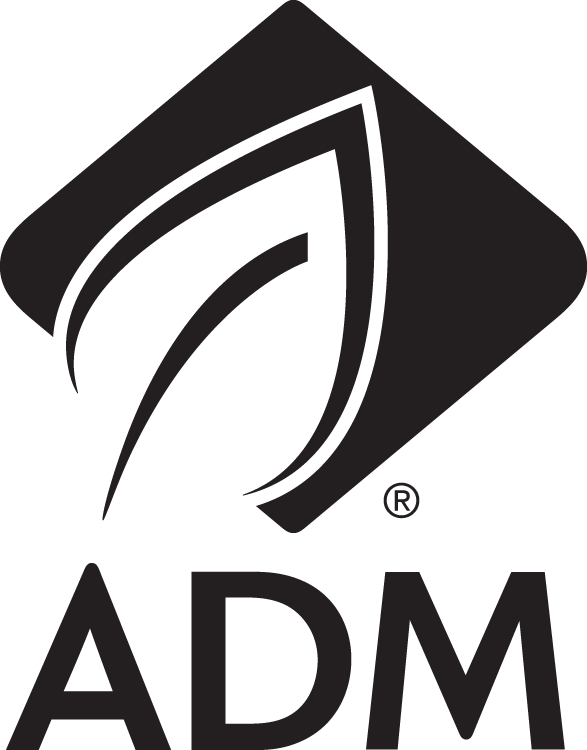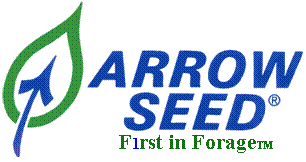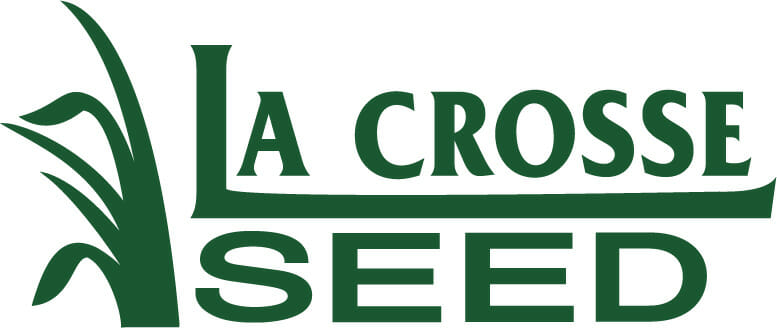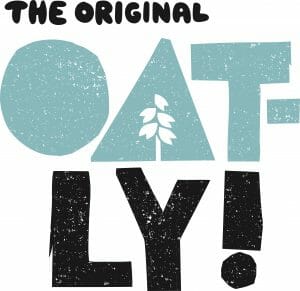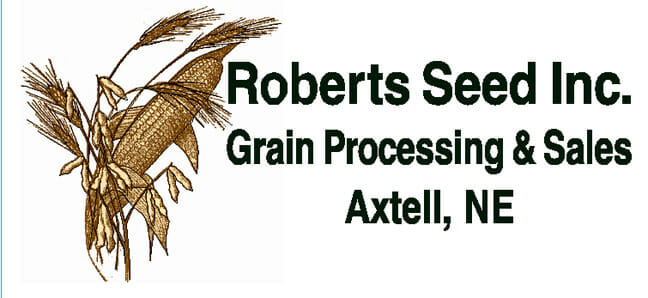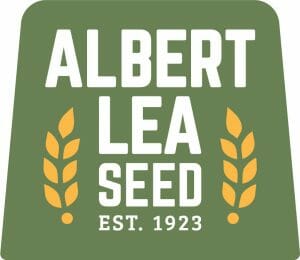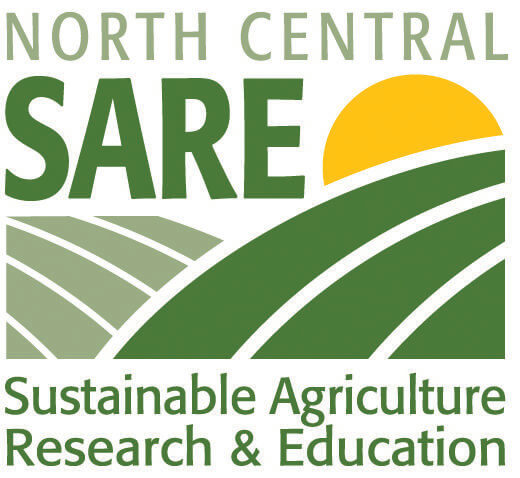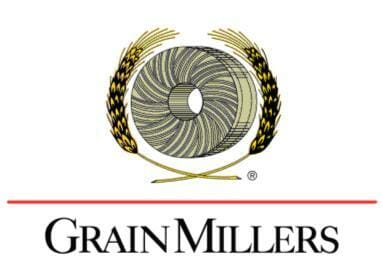Walk-in registration is available at our annual conference this weekend. Learn more.
2022 Small Grains Conference
 March 1 | Lincoln, NE | Nebraska Innovation Campus
March 1 | Lincoln, NE | Nebraska Innovation Campus
This regional conference brings together farmers, supply chain buyers and researchers to share their expertise on successful farming with small grains in extended rotations.
Sponsors | Conference Agenda | Sessions | COVID-19 Policy (Updated Feb. 25)
Conference Agenda
| Time | Event |
|---|---|
| 8 a.m. | Conference hall opens with continental breakfast and exhibitor hall |
| 9 - 10 a.m. | Opening remarks and plenary address |
| 10:15 - 11:15 a.m. | Session Block I |
| 11:15 - 11:30 a.m. | Break |
| 11:30 a.m. - 12:30 p.m. | Session Block II |
| 12:30 - 2 p.m. | Lunch and networking opportunities with exhibitors |
| 2:15 - 3:15 p.m. | Session Block III |
| 3:15 - 3:30 p.m. | Break |
| 3:30 - 4:15 p.m. | Closing remarks and goodbyes |
Plenary Address
A Paradigm Shift That Started With Small Grains
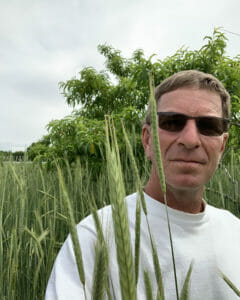 Gail Fuller’s current farm looks a lot different than what he operated three decades ago. In the 1990s, he farmed 3,200 acres of conventional corn and soybeans, using RoundUp Ready technology when it came on the market. Today, he co-owns a 162-acre perennial food farm raising livestock, fruit, nut and vegetable crops. How did he get to where he is today?
Gail Fuller’s current farm looks a lot different than what he operated three decades ago. In the 1990s, he farmed 3,200 acres of conventional corn and soybeans, using RoundUp Ready technology when it came on the market. Today, he co-owns a 162-acre perennial food farm raising livestock, fruit, nut and vegetable crops. How did he get to where he is today?
It took a complete change in mindset that began with diversifying his rotation. When Gail started growing wheat and other small grains on the farm in the early 2000s, the regenerative practices he was trying to implement started to click together. Erosion decreased. Yields increased. Earthworms returned. Gail realized that diversity does indeed beget diversity, and that by growing more crops he could not only feed his soil, but his community as well. Join Gail as he recounts his shift towards a more regenerative and resilient farm and the challenges he’s faced along the way.
Gail Fuller operates Fuller Farms with his partner, Lynnette Miller, in eastern Kansas. Gail and Lynnette raise a diverse mix of livestock, grain, fruit, nuts and vegetables. In 2012, Gail started the Fuller Field School with Jill Clapperton, an internationally known soil health specialist, to bring together researchers, farmers and community members to share ideas and experiences about regenerative farming.
Sessions
Session 1 – 10:15-11:15 a.m.
Manure Management in Small-Grain Systems
Using manure in your small-grain system can provide fertility for your next crop while helping free up manure storage in your pits in the summer, just when manure management can be a challenge. Learn best practices for incorporating manure into your fertilizer program, including how to apply manure to small-grain fields and what nutrient contributions you can expect.
 Russ Brandes is a fourth-generation farmer near Hancock, Iowa, where he grows corn, soybeans, alfalfa, rye seed and grass and raises cow-calves and swine. Russ uses no-till and cover crops on all his acres. He has served as a soil and water conservation district commissioner and was named a master farmer by Wallaces Farmer.
Russ Brandes is a fourth-generation farmer near Hancock, Iowa, where he grows corn, soybeans, alfalfa, rye seed and grass and raises cow-calves and swine. Russ uses no-till and cover crops on all his acres. He has served as a soil and water conservation district commissioner and was named a master farmer by Wallaces Farmer.
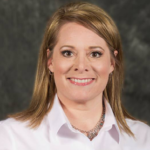 Amy Schimdt is an associate professor at University of Nebraska-Lincoln who leads an integrated research and extension program focused on supporting socially and environmentally responsible livestock
Amy Schimdt is an associate professor at University of Nebraska-Lincoln who leads an integrated research and extension program focused on supporting socially and environmentally responsible livestock
Growing and Selling Cover Crop Seed
Cover crop seed is one of the biggest potential markets for small grains in the Midwest. If you’re looking to add a third crop to your rotation, growing your own cover crop seed is a practical way to start diversifying the farm. But how do you ensure small grains like rye, triticale and oats have good yield, test weight, purity and, most importantly, germination, for use as cover crop seed? And how can you ensure that you are not in violation of any state seed laws or licensing agreements? Keith Berns has over 12 years of experience growing and selling cover crop seed across the country. In this session, Keith will walk through the basics of how to get started growing small grains for seed, share tips for success in the cover crop marketing world and discuss laws governing selling seed off the farm.
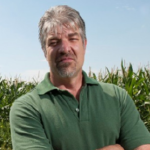 Keith Berns farms with his family on 2,500 acres of irrigated and dryland ground in south-central Nebraska. The Berns raise corn, soybeans, rye, triticale, peas, buckwheat and sunflowers and are completely no-till. In 2008, Keith co-founded Green Cover Seed with his brother, Brian, and in 2012 launched the SmartMix Calculator to help farmers select cover crop seed and build custom mixes.
Keith Berns farms with his family on 2,500 acres of irrigated and dryland ground in south-central Nebraska. The Berns raise corn, soybeans, rye, triticale, peas, buckwheat and sunflowers and are completely no-till. In 2008, Keith co-founded Green Cover Seed with his brother, Brian, and in 2012 launched the SmartMix Calculator to help farmers select cover crop seed and build custom mixes.
Building Soil N With Red Clover
Planting long-season legumes after small grains lets you grow soil nitrogen on-farm, reducing expenses as the cost of synthetic N skyrockets. Join researcher Katja Koehler-Cole and farmer Lee Buchholz as they discuss using a red clover cover crop to contribute N ahead of corn. Learn what N contributions to expect and hear how Lee successfully underseeds clover with small grains and terminates clover before corn.
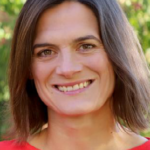 Katja Koehler-Cole is a research assistant professor in the Department of Agronomy and Horticulture at the University of Nebraska-Lincoln. She works with cover crops in a variety of cropping systems, with the goals of improving soil health, sustainability and profitability of Nebraska farms.
Katja Koehler-Cole is a research assistant professor in the Department of Agronomy and Horticulture at the University of Nebraska-Lincoln. She works with cover crops in a variety of cropping systems, with the goals of improving soil health, sustainability and profitability of Nebraska farms.
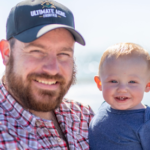 Lee Buchholz farms with his father in Avoca, Nebraska, raising corn, soy, alfalfa, oats and rye. The Buchholzs no-till and have been cover cropping for 10 years. Lee has recently started growing long-season clover after rye and has seen the benefits. He and his wife Morgan have a year-old son, Conway.
Lee Buchholz farms with his father in Avoca, Nebraska, raising corn, soy, alfalfa, oats and rye. The Buchholzs no-till and have been cover cropping for 10 years. Lee has recently started growing long-season clover after rye and has seen the benefits. He and his wife Morgan have a year-old son, Conway.
Session 2 – 11:30 a.m. – 12:30 p.m.
Feeding Small-Grain Silage to Livestock
Join Justin Raikes and Jarrod Knorr to learn how small grains can serve as a valuable livestock feedstuff. They are currently feeding ryelage as an alfalfa replacement and as a supplement to corn silage. Justin will explain how to manage and implement ryelage in a beef feedlot. Topics will include seeding rates, planting, harvest and performance observations. Attend this session and see why row crops, small grains and livestock are natural partners in a diversified operation.
 Justin Raikes and his family own and operate Raikes Farm Enterprises in Ashland, Nebraska. The farm produces Angus and Waygu beef, row crops, cover crops and small grains, and markets beef directly to consumers through its retail brand, Raikes Beef Company. Focusing on producing quality food through environmental stewardship, the farm prioritizes sustainable farming practices and humane animal handling.
Justin Raikes and his family own and operate Raikes Farm Enterprises in Ashland, Nebraska. The farm produces Angus and Waygu beef, row crops, cover crops and small grains, and markets beef directly to consumers through its retail brand, Raikes Beef Company. Focusing on producing quality food through environmental stewardship, the farm prioritizes sustainable farming practices and humane animal handling.
Jarrod Knorr is the cattle manager at Raikes Farm Enterprises, where he oversees two feedyards with a standing capacity of 9,000 head and helps manage a 600-head cow-calf operation and the farm’s organic row crop operations. Jarrod helped launch Raikes Beef Company by initiating Wagyu F1 crosses and has continued to lead breeding efforts.
An Old Variety for a New Use: One Man’s Mission to Restore Balboa Rye
Chris Teachout was considering roller-crimping rye covers when he had an epiphany. He recalled Balboa rye, a variety he planted in the ‘80s that popped like bubble wrap when bent. Chris set out to find seed, but soon found that it was nearly non-existent. Thus began his mission to recover the variety. Hear how Chris is restoring Balboa, what he’s learned along the way and the exciting multipurpose characteristics this variety has to offer.
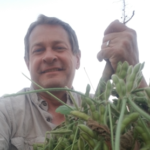 Chris Teachout is a fifth-generation farmer in southwest Iowa, where he and his wife, Janenne, grow corn, soybeans and cover crops, with a goal of building healthy soil and feeding the soil microorganisms they refer to as their “herd of underground livestock.” As part of this interest, the Teachouts frequently run trials on cover crops and soil health. Chris and Janenne raised three children on the farm and enjoy their three grandchildren.
Chris Teachout is a fifth-generation farmer in southwest Iowa, where he and his wife, Janenne, grow corn, soybeans and cover crops, with a goal of building healthy soil and feeding the soil microorganisms they refer to as their “herd of underground livestock.” As part of this interest, the Teachouts frequently run trials on cover crops and soil health. Chris and Janenne raised three children on the farm and enjoy their three grandchildren.
Making Winter Wheat Work for Your Farm
Want to maximize the potential of diversifying a rotation with a fall-seeded small grain like winter wheat? Come hear Nathan Mueller discuss the best management practices for a successful wheat crop and how wheat can benefit your entire crop rotation. Nathan will walk through important considerations like planting dates and rate, fertilizer programs and disease management.
 Nathan Mueller is a water and integrated cropping systems extension educator at University of Nebraska Lincoln. He works to provide farmers in east and south-central Nebraska with agronomic support for integrating wheat into their cropping rotation. Nathan grew up on a dairy farm in eastern Nebraska.
Nathan Mueller is a water and integrated cropping systems extension educator at University of Nebraska Lincoln. He works to provide farmers in east and south-central Nebraska with agronomic support for integrating wheat into their cropping rotation. Nathan grew up on a dairy farm in eastern Nebraska.
Session 3 – 2:15 – 3:15 p.m.
Grazing Summer Cover Crops
Join Paul Ackley and Dan Theilen to learn about why grazing summer cover crops is a worthwhile practice for livestock and landowners. Paul has been grazing his cattle on summer covers for over 10 years. Dan has partnered with a neighboring cattle farmer to add livestock onto his land for part of the grazing season. Attend this session and learn why summer small grains and livestock can work together.
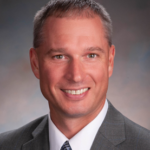 Dan Theilen has a bachelor’s degree in agronomy from the University of Nebraska-Lincoln. He farms 350 acres using a rotation that consists of corn, soybeans, cover crops and wheat on family-owned land in eastern Nebraska. One of his passions is learning more about conservation agriculture. He has been actively farming for three years has a full-time role as a professional farm manager in southeast Nebraska representing absentee landowners.
Dan Theilen has a bachelor’s degree in agronomy from the University of Nebraska-Lincoln. He farms 350 acres using a rotation that consists of corn, soybeans, cover crops and wheat on family-owned land in eastern Nebraska. One of his passions is learning more about conservation agriculture. He has been actively farming for three years has a full-time role as a professional farm manager in southeast Nebraska representing absentee landowners.
 Paul Ackley and his family operate an integrated farm near Bedford, Iowa, raising corn, soybeans, wheat, cattle and hair sheep. Paul says having a small-grain in their rotation helps to regenerate their soil, reduce inputs, spread out the labor and provide wildlife habitat
Paul Ackley and his family operate an integrated farm near Bedford, Iowa, raising corn, soybeans, wheat, cattle and hair sheep. Paul says having a small-grain in their rotation helps to regenerate their soil, reduce inputs, spread out the labor and provide wildlife habitat
Organic Specialty Small Grains: Production and Marketing
Dave Vetter has been using a nine-year rotation on his organic farm for over three decades. He will discuss how heirloom barley fits into this complex rotation and his successes and failures producing this specialty crop. Dave will also discuss how Grain Place Foods works with farmers to source whole grains and seeds for its processing facility, and the complexities of marketing farm-to-table organic grains.
 Dave Vetter farms 280 acres in Hamilton County, Nebraska, and is the president of Grain Place Foods, which cleans, mills and markets organic whole grains and seeds. The farm raises organic corn, popcorn, soybeans, barley, hogs and grass-finished cattle. Grain Place Foods employs two dozen people and markets to a variety of restaurants and stores across Nebraska and Iowa.
Dave Vetter farms 280 acres in Hamilton County, Nebraska, and is the president of Grain Place Foods, which cleans, mills and markets organic whole grains and seeds. The farm raises organic corn, popcorn, soybeans, barley, hogs and grass-finished cattle. Grain Place Foods employs two dozen people and markets to a variety of restaurants and stores across Nebraska and Iowa.
Boosting Profits With Small Square Bales
The economic value of small-grain straw should not be overlooked. Taken together, the profits from both grain and straw can rival corn and soybeans in many years. Join farmers Angela Knuth and Dylan Spatz as they walk through the production and marketing of their small square bales and how they’re adding value to their operations.
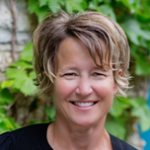 Angela Knuth farms with her husband, Kerry, and their two sons in Mead, Nebraska. The Knuths raise corn, soybeans, wheat, alfalfa and oats, and market an average of 5,500 small square bales a year. They focus on pursuing sustainable farming systems and are adopting new technology and introducing farm-level traceability into the supply chain.
Angela Knuth farms with her husband, Kerry, and their two sons in Mead, Nebraska. The Knuths raise corn, soybeans, wheat, alfalfa and oats, and market an average of 5,500 small square bales a year. They focus on pursuing sustainable farming systems and are adopting new technology and introducing farm-level traceability into the supply chain.
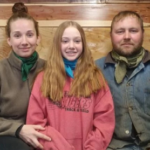 Dylan Spatz farms with his wife, Dani, on 30 acres in Saunders County, Nebraska. On average, Dylan locally markets 5,000 small square bales of wheat straw per year. Additionally, the Spatzes have a cow-calf operation of Irish Dexters and direct-market their beef.
Dylan Spatz farms with his wife, Dani, on 30 acres in Saunders County, Nebraska. On average, Dylan locally markets 5,000 small square bales of wheat straw per year. Additionally, the Spatzes have a cow-calf operation of Irish Dexters and direct-market their beef.
COVID-19 Policy
Winter Event COVID-19 Policy: Updated Feb. 25, 2022
At Practical Farmers of Iowa, the safety of our staff, members and communities are our top priority.
Following the guidance issued by the CDC on Feb. 25, 2022, PFI has updated our COVID-19 policy regarding indoor, in-person events effective immediately, and until further notice.
PFI COVID-19 Event Policy:
- If the event is held in a county with a COVID-19 Community Level of “High” at the time of the event, a properly worn face mask is required for all attendees regardless of vaccination status, except when actively eating or drinking.
- If the event is held in a county where COVID-19 Community Level is “Low” or “Medium”, masks are optional for staff and attendees.
- Staff and attendees will be encouraged to practice good hand hygiene. Hand sanitizer will be readily available at the event.
If you have additional questions about safety measures in place for this event, please contact Liz Kolbe, liz@practicalfarmers.org, (515) 232-5661.
We’re looking forward to having this event in person, and greatly appreciate your contribution to making our space as safe as possible for staff, attendees and our communities.
Thank You to Our Sponsors!
Panicle level:
Spikelet level:
Interested in becoming a sponsor? View our opportunities here.
Event Questions
For questions, contact Lydia English at (515) 232-5661 or lydia@practicalfarmers.org

